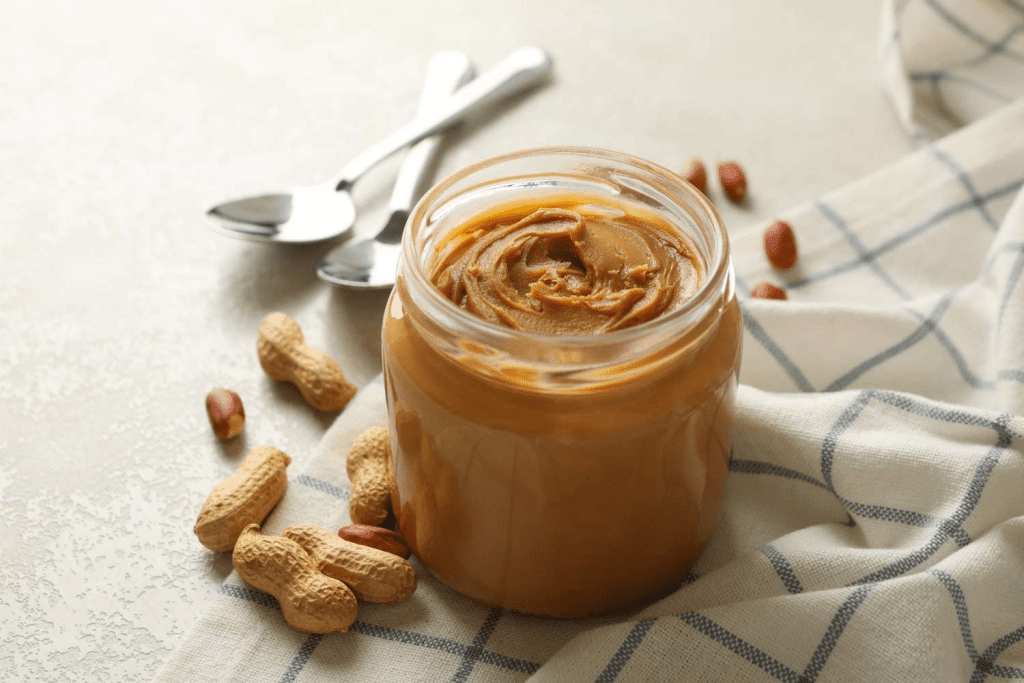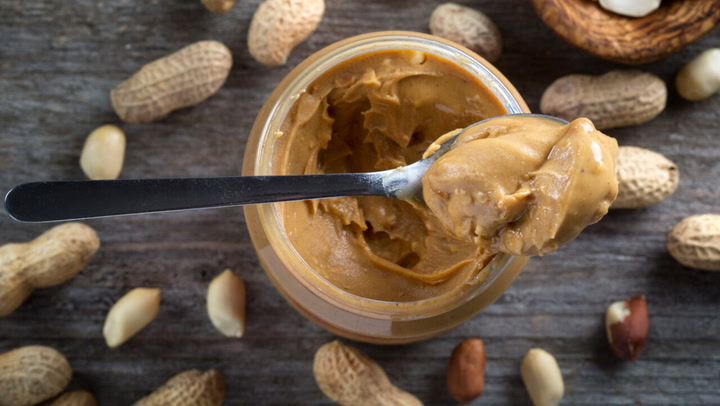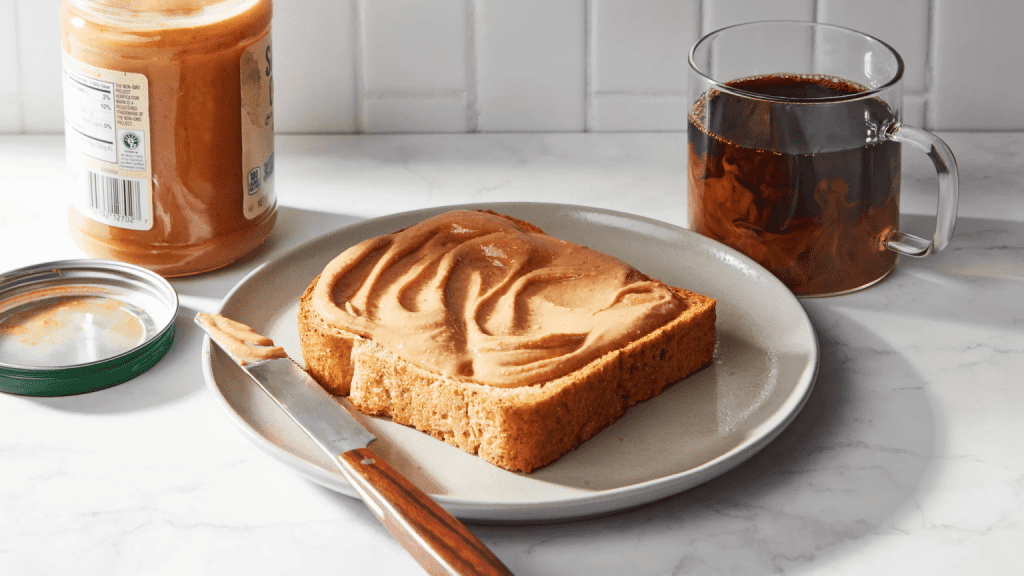Peanut butter is a beloved staple in many households, but one debate seems to persist: should it be stored in the fridge or the pantry? Some argue that it should be kept at room temperature for convenience, while others insist that refrigeration is essential for maintaining freshness. To settle this debate, it’s important to understand the different types of peanut butter and how storage impacts their taste, texture, and longevity.

Pantry Storage: The Smooth and Convenient Choice
For most commercially processed peanut butters, like popular store-bought brands, pantry storage is the preferred method. These varieties are typically loaded with preservatives, stabilizers, and added oils that help extend their shelf life and maintain a creamy consistency. Keeping peanut butter in the pantry ensures it remains soft, smooth, and spreadable for longer periods.
Pros of Pantry Storage:
- Easier to Spread: Storing peanut butter at room temperature ensures it stays soft, making it easy to spread on bread, crackers, or fruit. No need to wait for it to soften, which is ideal for those on the go.
- Convenience: Having peanut butter in the pantry means it’s always accessible and ready for a quick snack or meal. You can simply scoop it out without any preparation.
- Long Shelf Life: Commercially processed peanut butters can last unopened for up to a year and remain fresh for several months after opening. These products are designed to be shelf-stable due to the added preservatives.
However, even pantry storage has its minor downsides. Over time, peanut butter oils may separate, requiring a quick stir to blend everything back together. While this doesn’t affect the taste, some people find the slight separation to be a nuisance.
Fridge Storage: Extending Freshness for Natural Varieties
Natural peanut butter, on the other hand, tells a different story. Since it often contains just peanuts (and sometimes a little salt) without added oils or preservatives, it’s more susceptible to spoilage if left out at room temperature. For these more wholesome versions, refrigeration is often recommended to keep them fresh for longer periods.
Pros of Fridge Storage:
- Extended Shelf Life: Keeping natural peanut butter in the fridge can prevent it from spoiling too quickly, significantly increasing its freshness. Without preservatives, natural peanut butter tends to go rancid faster at room temperature.
- Reduced Oil Separation: Refrigeration helps slow down the natural oil separation that occurs in peanut butter, keeping the consistency more stable. This means fewer instances of needing to stir before each use.
- Safe and Fresh: The cool environment of the fridge ensures your natural peanut butter remains safe to eat for weeks or even months after opening, reducing the risk of rancidity.
Despite the extended freshness, refrigerating peanut butter—especially natural kinds—can make it harder to spread. Cold peanut butter tends to harden, making it challenging to scoop or spread without letting it sit out for a bit. This extra step might not appeal to those seeking a quick and easy snack.
Understanding the Differences: Processed vs. Natural Peanut Butter
To make the right storage choice, it’s crucial to understand the key differences between processed and natural peanut butter.

Processed Peanut Butter: Typically contains stabilizers and additives that prevent oil separation and extend shelf life. These stabilizers allow it to remain fresh and creamy for extended periods, even when stored at room temperature. Processed peanut butter is designed for pantry storage and doesn’t require refrigeration.
Natural Peanut Butter: Made from just peanuts, or peanuts and salt, natural peanut butter lacks preservatives and stabilizers. This makes it more vulnerable to spoilage, especially if left unrefrigerated for too long. The oils in natural peanut butter tend to separate and rise to the top, especially when stored at room temperature, requiring regular stirring to maintain a consistent texture.
Which is Better for You?
When deciding where to store your peanut butter, consider both the type of peanut butter and your personal preferences.
- For Processed Peanut Butter: Keeping it in the pantry is perfectly fine. It’s designed to remain fresh at room temperature for months, and storing it in the fridge would only make it harder to spread. If convenience and ease of use are your priorities, the pantry is the way to go.
- For Natural Peanut Butter: The fridge is your best option. Refrigeration preserves the freshness of natural peanut butter by preventing the oils from going rancid. Although it may harden slightly in the fridge, you can always let it sit at room temperature for a few minutes before using it to regain a smoother consistency.
How Long Does Peanut Butter Last?
Storage methods can have a significant impact on the shelf life of peanut butter. Here’s a quick overview of how long you can expect different types of peanut butter to last:
- Processed Peanut Butter (Pantry): Unopened, it can last up to a year. Once opened, it remains good for 3-6 months.
- Processed Peanut Butter (Fridge): While unnecessary, storing processed peanut butter in the fridge can extend its shelf life to 6-9 months after opening.
- Natural Peanut Butter (Pantry): Unopened, it lasts about a month or two. Once opened, it’s best consumed within 1-2 months.
- Natural Peanut Butter (Fridge): Storing natural peanut butter in the fridge can keep it fresh for 3-6 months after opening.
Tips for Proper Storage

Regardless of whether you choose the fridge or the pantry, here are a few tips for storing peanut butter to maximize freshness:
- Seal It Tight: Always make sure the lid is tightly closed after use to prevent exposure to air, which can cause the oils to oxidize and spoil faster.
- Stir Before Refrigerating: For natural peanut butter, give it a good stir to mix the oils before placing it in the fridge. This can help prevent excess oil separation.
- Keep it Away from Heat: If storing peanut butter in the pantry, avoid placing it near heat sources, such as the stove or direct sunlight, as heat can cause the oils to spoil more quickly.
Conclusion: The Final Verdict on Peanut Butter Storage
The question of whether peanut butter belongs in the fridge or the pantry ultimately depends on the type of peanut butter you prefer. Processed peanut butter, with its preservatives and stabilizers, is perfectly fine in the pantry, where it stays soft and ready to use. On the other hand, natural peanut butter, free of preservatives, benefits from refrigeration to maintain its freshness and prevent spoilage.
No matter where you store your peanut butter, both options have their advantages. So, choose the method that suits your lifestyle and enjoy your peanut butter in the way that works best for you!